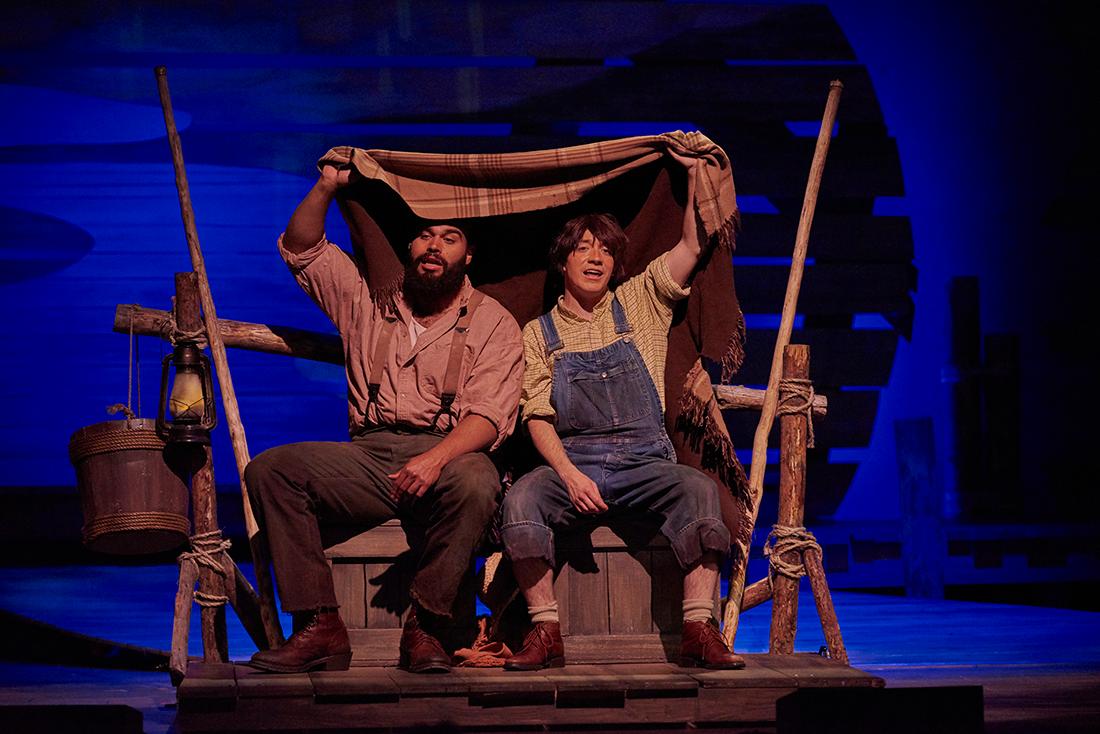LOGAN — According to the disclaimer penned by Mark Twain, persons attempting to find a moral in his book The Adventures of Huck Finn are to be banished. Despite his warning Big River, the musical adaptation of Huck’s adventure down the Mississippi River, provides plenty of opportunity to examine questions surrounding the tenets of equality, morality, and kindness in the period of American slavery. Traveling with a runaway slave named Jim, Huck discovers that the way he’s been taught to think isn’t always in line with his own moral compass: that Jim seems to care about his people the same way white folks do, that jokes at others’ expense aren’t always funny, and that on a rare and confusing occasion, telling the truth seems to be the best option. For those who prefer to heed Mr. Twain’s warning, Big River is also plenty of fun.

Staged in the beautiful Caine Theatre, this Lyric Rep production provided a nearly seamless blend of imagination and technology to transport me along a river journey from Missouri to Arkansas. Shawn Fisher‘s simple set design featured a slatted depiction of a river winding toward the horizon. When lit according to Bruce Duerden’s design, the sun appeared to rise or set, coloring the sky in shades of rose and orange. At night, the river glowed blue as if lit by the moon, a gently waving light adding subtle motion between the shores. Soft sound effects added by Bryan Z. Richards mimicked nature’s soundtrack, the water droplets and echo in the cave making the theater’s walls all but disappear. This simplicity extended through Robin Perry‘s prop design as wooden benches became ferries, canoes, and every conceivable watercraft with the exception of the main raft. Together, these effects nudged my imagination in the requisite direction, allowing the actors to build each scene on an established foundation.
Under the direction of Jim Christian, no detail of maintaining mood and setting was overlooked. Relying heavily on pantomime, Christian designed blocking sequences to establish narrow ledges, low entrances, and distinct weather patterns. Although I couldn’t see these elements directly, I completely believed in their existence because of the commitment and consistency of each actor. After having been asked to buy into nonexistent elements throughout, however, I was disappointed in the falling rain projected on the stage for “River in the Rain.” The drops were disproportional in size to the set and characters, and the juxtaposition was jarring. Thankfully, Cameron Blankenship (playing Huck) and Paul-Jordan Jansen (playing Jim) huddled under a blanket carefully deflecting the rain, and their pantomime and powerful singing pulled me back into the moment.

I have nothing but praise for the voices of Blankenship and Jansen whose performances so elevated the characters of Huck and Jim that I may never be able to enjoy another production of Big River again. I would have forgiven Blankenship for lightening his character voice to reach the requisite tenor notes in Huck’s score; that he never sacrificed the accent nor vocal quality is still a wonder to me, especially as he also a achieved a powerful blend with Jansen’s gospel sound. The credit for an evening of professional vocals rests not only with the actors but with Christian, who also worked as music director and choreographer. Relying on emotional character rather than physical movement, Christian often required Jansen to deliver lengthy solos without so much as a shift of weight. Backed by a rich ensemble, Jansen performed most of “Free at Last” seated on a stool, standing only once to increase the dramatic effect. By letting the songs speak for themselves, Christian created moments that left me speechless.

This production acted as a showcase for character development with many standing out even among such a deep pool of talent. From the beginning, I was struck by Keely McGaw, whose stiff posture as Miss Watson provided direct contrast to Huck’s boyishness. Asked to perform as both supporting characters and ensemble, Wyn Moreno as Papa Finn made important distinctions in his mannerisms as well as his physical look to make a believable transition. Katie Francis and Clarissa Boston were impressive, sliding out of their fiddle positions in the live music ensemble to take turns on stage as needed. Justin Turpin also doubled up, taking his charismatic Tom Sawyer to the guitar. Of all the outstanding performances, however, I most appreciated Jansen’s delivery of the monologue in which Jim narrates how he discovered his daughter was deaf. In a production full of comedy, Jansen achieved complete sincerity.
I still have pages of notes full of praise for the details in this production: the decision to costume a Mark Twain (played by W. Vosco Call) for the opening, Tom Sawyer’s clear tenor harmonies, and the smart use of raised platforms to maximize space. I wanted to expound on the full harmonies of “The Boys” despite the small number on stage, to describe the manner in which an understated “Muddy Water” filled the space, and to talk about the charm of having Huck play the ocarina instead of whistling during “I, Huckleberry Me.” I want to set the scene to try to convey the emotional depth of “Leavin’s not the Only Way to Go,” but no words I write will even begin to convey the power in this production. If there is any way you can make it to Logan this summer, let the cast of Big River take you on this adventure themselves.
[box]The Lyric Repertory Company production of Big River plays July 12, 15, 17, 25, August 3, and 5 at 7:30 PM and July 29 at 1 PM at the Caine Lyric Theatre (28 West Center Street, Logan). Tickets are $20-35. For more information, visit cca.usu.edu/theatre/about-us/lyric.[/box]
